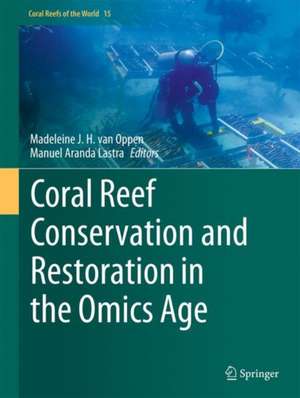Coral Reef Conservation and Restoration in the Omics Age: Coral Reefs of the World, cartea 15
Editat de Madeleine J. H. van Oppen, Manuel Aranda Lastraen Limba Engleză Hardback – 13 sep 2022
| Toate formatele și edițiile | Preț | Express |
|---|---|---|
| Paperback (1) | 951.87 lei 6-8 săpt. | |
| Springer International Publishing – 14 sep 2023 | 951.87 lei 6-8 săpt. | |
| Hardback (1) | 811.65 lei 38-44 zile | |
| Springer International Publishing – 13 sep 2022 | 811.65 lei 38-44 zile |
Din seria Coral Reefs of the World
- 18%
 Preț: 1118.62 lei
Preț: 1118.62 lei - 18%
 Preț: 946.72 lei
Preț: 946.72 lei - 18%
 Preț: 1385.37 lei
Preț: 1385.37 lei - 18%
 Preț: 1573.99 lei
Preț: 1573.99 lei - 18%
 Preț: 1240.93 lei
Preț: 1240.93 lei - 24%
 Preț: 1076.16 lei
Preț: 1076.16 lei - 15%
 Preț: 671.48 lei
Preț: 671.48 lei - 15%
 Preț: 658.37 lei
Preț: 658.37 lei - 18%
 Preț: 1696.30 lei
Preț: 1696.30 lei - 18%
 Preț: 1873.10 lei
Preț: 1873.10 lei - 24%
 Preț: 1937.46 lei
Preț: 1937.46 lei - 24%
 Preț: 804.04 lei
Preț: 804.04 lei - 24%
 Preț: 697.94 lei
Preț: 697.94 lei - 18%
 Preț: 1124.15 lei
Preț: 1124.15 lei - 24%
 Preț: 643.01 lei
Preț: 643.01 lei - 24%
 Preț: 930.25 lei
Preț: 930.25 lei - 24%
 Preț: 1249.89 lei
Preț: 1249.89 lei
Preț: 811.65 lei
Preț vechi: 1067.97 lei
-24% Nou
Puncte Express: 1217
Preț estimativ în valută:
155.33€ • 161.57$ • 128.23£
155.33€ • 161.57$ • 128.23£
Carte tipărită la comandă
Livrare economică 10-16 aprilie
Preluare comenzi: 021 569.72.76
Specificații
ISBN-13: 9783031070549
ISBN-10: 3031070542
Pagini: 242
Ilustrații: VIII, 242 p. 48 illus. in color.
Dimensiuni: 210 x 279 mm
Greutate: 0.88 kg
Ediția:1st ed. 2022
Editura: Springer International Publishing
Colecția Springer
Seria Coral Reefs of the World
Locul publicării:Cham, Switzerland
ISBN-10: 3031070542
Pagini: 242
Ilustrații: VIII, 242 p. 48 illus. in color.
Dimensiuni: 210 x 279 mm
Greutate: 0.88 kg
Ediția:1st ed. 2022
Editura: Springer International Publishing
Colecția Springer
Seria Coral Reefs of the World
Locul publicării:Cham, Switzerland
Cuprins
Introduction to Coral Reef Conservation and Restoration in the Omics Age.- Incorporating Genetic Measures of Connectivity and Adaptation in Marine Spatial Planning for Corals.- Maximizing Genetic Diversity in Coral Restoration Projects.- Identifying, Monitoring, and Managing Adaptive Genetic Variation in Reef-Building Corals Under Rapid Climate Warming.- Selective Breeding to Enhance the Adaptive Potential of Corals.- Coral Conservation from the Genomic Perspective on Symbiodiniaceae Diversity and Function in the Holobiont.- Dynamics of Bacterial Communities on Coral Reefs: Implications for Conservation.- Increasing Coral thermal Bleaching Tolerance via the Manipulation of Associated Microbes.- Epigenetics and Acquired Tolerance to Environmental Stress.- Can Gene Expression Studies Inform Coral Reef Conservation and Restoration?.- A Need for Reverse Genetics to Study Coral Biology and Inform Conservation Efforts.- Informing Coral Reef Conservation Through Metabolomic Approaches.- Environmental DNA for Biodiversity Monitoring of Coral Reefs.- Cryopreservation to Conserve Genetic Diversity of Reef-Building Corals.- Synthesis: Coral Reef Conservation and Restoration in the Omics Age.
Notă biografică
Madeleine van Oppen is an Australian Research Council Laureate Fellow and Professor at the University of Melbourne and the Australian Institute of Marine Science. She completed her PhD on the molecular biogeography of seaweeds in 1995, followed by postdocs on the population and evolutionary genetics of Cichlid fishes and reef-building corals. Her current research is aimed at enhancing climate resilience of corals.
Manuel Aranda is an Associate Professor at the King Abdullah University of Science and Technology in Thuwal, Saudi Arabia. In 2006 he completed his PhD on the evolution of gene regulatory networks in insects, followed by a postdoc in the same field before moving to work on corals. In his current research he uses genomics and epigenomics approaches to study the molecular underpinnings of the coral-algal symbiosis and the potential of human interventions to increase their resilience.
Manuel Aranda is an Associate Professor at the King Abdullah University of Science and Technology in Thuwal, Saudi Arabia. In 2006 he completed his PhD on the evolution of gene regulatory networks in insects, followed by a postdoc in the same field before moving to work on corals. In his current research he uses genomics and epigenomics approaches to study the molecular underpinnings of the coral-algal symbiosis and the potential of human interventions to increase their resilience.
Textul de pe ultima copertă
The rapid demise of coral reefs worldwide has spurred efforts to develop innovative conservation and restoration methods. Many of these rely on omics approaches to produce genetic, genomic, transcriptomic, epigenomic or metabolomic data to inform conservation and restoration interventions. This book provides the state of play of this field. It discusses topics ranging from how genomic and environmental DNA (eDNA) data can be used to inform marine protected area design and cryopreservation strategies, the use of knowledge on adaptive genetic and epigenetic variation to maximise environmental stress tolerance of coral stock, harnessing transcriptome data to develop early warning markers, the use of microbial symbiont omics data in guiding restoration strategies, to applications of metabolomics and genetic engineering. How best to translate omics data to resource managers is also discussed.
Caracteristici
A unique book, the first one with this focus and content Chapter authors are leaders and upcoming leaders in the field A huge amount of literature will be synthesized in the one work
